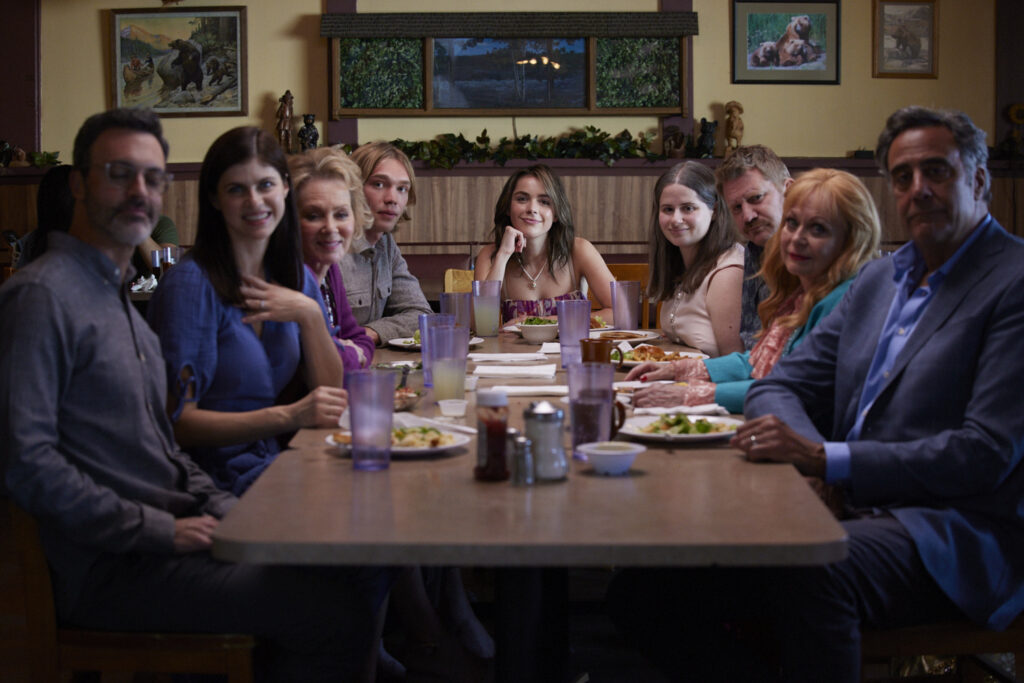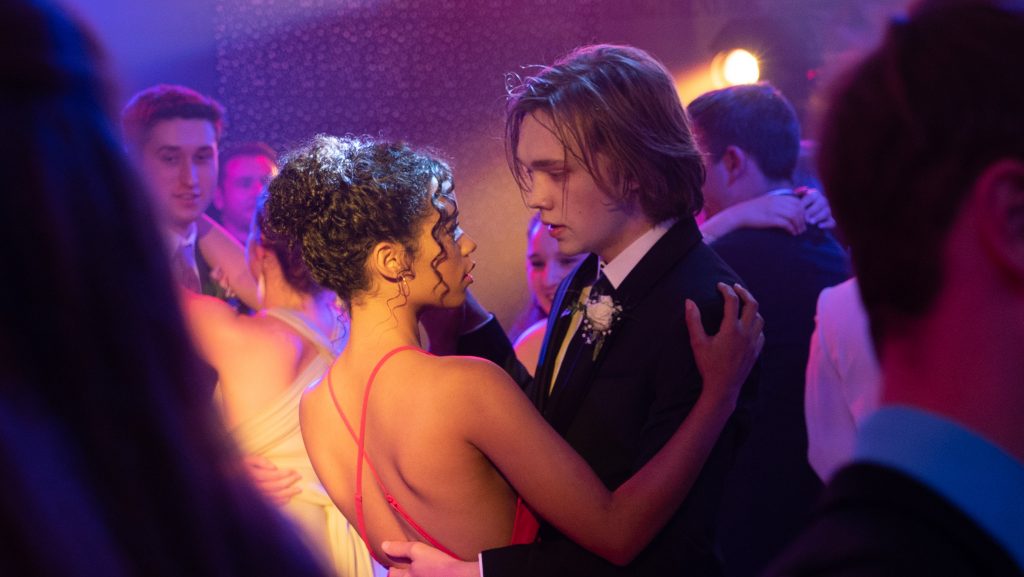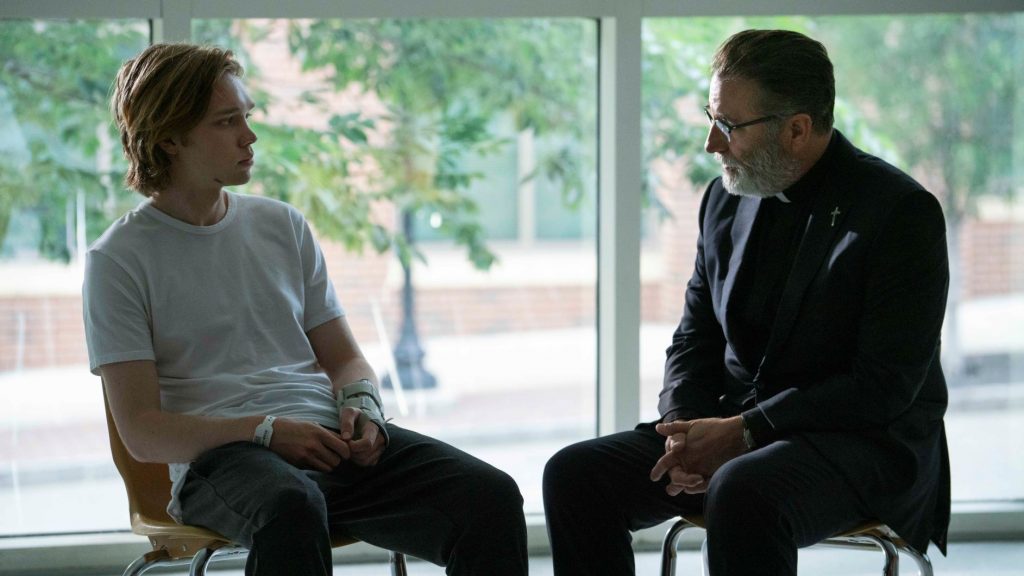March 19, 2023
by Carla Hay

Directed by Matt Smukler
Culture Representation: Taking place in an unnamed city in Nevada (and briefly in Van Nuys, California), the comedy/drama film “Wildflower,” which is based on real people, features a predominantly white cast of characters (with a few African Americans, Asians and Latinos) representing the working-class. middle-class and wealthy.
Culture Clash: A sarcastic and intelligent teenager, who is in her last year of high school, gets in a coma after a mysterious accident, and she narrates her life story of being raised by intellectually disabled parents whom she resents because they depend on her to be the most responsible person in the household.
Culture Audience: “Wildflower” will appeal mainly to people who are fans of the movie’s headliners and don’t mind watching rambling and disjointed stories about teenagers and bickering families.

Based on a true story, “Wildflower” has an admirable performance from Kiernan Shipka, but there are too many problems with this uneven dramedy, including awkward subplots that go nowhere and underdeveloped characters that are bad parodies of real people. It’s one of those movies that has much of the narrative coming from voiceovers of a character who’s supposed to be in a coma. Very few movies can pull off this type of narrative in a way that is appealing. In “Wildflower,” the coma narration is cringeworthy—and so are many other parts of this misguided film.
Directed by Matt Smukler and written by Jana Savage, “Wildflower” is inspired by the real-life experiences of Smukler’s family. According to the “Wildflower” production notes, the protagonist of the movie is based on Smukler’s niece Christina. As part of Christina’s college admission application to the University of California at Los Angeles (UCLA), Smukler made a short documentary film about Christina’s experiences growing up as a child of parents with intellectual disabilities. Savage came up with the idea to make Christina’s story into a scripted feature film. The result is “Wildflower” (which had its world premiere at the 2022 Toronto International Film Festival), but the film takes shameless detours into formulaic schmaltz that cheapens the quality of what could have been a more meaningful movie.
In the beginning of “Wildflower” (which takes place mostly in an unnamed city in Nevada) viewers see Bambi “Bea” Johnson (played by Shipka) is in a coma in a hospital. Bea is 17 years old and in her last year of high school. She has a head injury, but no one at the hospital knows how she got the injury. A flashback later shows how an unconscious Bea ended up at the hospital and what caused her injury. Bea’s voiceover narration tells viewers that she can’t remember how she got injured either, but she wants to tell her life story, based on what she remembers of her life.
Several of Bea’s worried family members have gathered in the hospital room. And because this movie is filled with clichés about bickering families, it doesn’t take long for the arguing to start. The movie doesn’t do a very good job of introducing these family members, who talk over each other and disjointedly show up in this hospital scene that takes place in the beginning of the movie. You probably have to take notes (mentally or literally) to keep track of all these squawking relatives.
Bea is the only child of Derek Johnson (played by Dash Mihok) and Sharon Johnson (played by Samantha Hyde), who have intellectual disabilities. A flashback later explains that Derek got a head injury in a car accident when he was 12 years old. Sharon was born with an underdeveloped brain.
Derek and Sharon used to live in Van Nuys, California. They met when Sharon was 21, and Derek (who was around the same age, maybe slightly older) was hired by Sharon’s parents to mow the family’s lawn. Sharon and Derek began dating each other soon afterward. Derek and Sharon quickly fell in love wither each other, and they eloped—much to the dismay of both of their families.
Sharon’s parents are Peg McDonald (played by Jean Smart) and Earl Edelman (played by Brad Garrett), who are now divorced. (Peg went back to her maiden surname after the divorce.) Peg and Earl are among the family members who are in Bea’s hospital room.
Derek’s parents are Loretta (played by Jacki Weaver) and Hal (played by Chris Mulkey), who are also divorced. Hal is not in the hospital room, but Loretta is—much to the disdain of Peg, because the two women have had a longstanding feud with each other. Derek is an only child.
Peg has another daughter: the materialistic and vain Joy (played by Alexandra Daddario), who has a condescending attitude toward her sister Sharon. Joy and her equally snooty husband Ben (played by Reid Scott) are also in the hospital room. Peg is a control freak who constantly complains if things don’t go her way. Joy is a lot like Peg.
Loretta, who smokes a lot and drinks a lot of alcohol, immediately annoys Peg by lighting up a cigarette inside the hospital room. It’s a very rude (not to mention illegal) thing for Loretta to do in a hospital room, but Peg is the only one in the family with the backbone to stand up to Loretta about it. The movie makes it a running gag that Loretta’s constant cigarette smoking annoys Peg. And it’s a “joke” that quickly gets old and tiresome. Loretta’s obnoxiousness is supposed to look “cute” because she’s a senior citizen, but it just looks grating.
Flashbacks show that after Derek and Sharon got married, both of their parents were worried about Derek and Sharon not being capable of raising a family. During a family meeting between Derek’s parents and Sharon’s parents, both couples agreed that it would be a bad idea for Derek and Sharon to become parents. The purpose of the meeting was to figure out what to do about this marriage that does not have the approval of all four of the newlyweds’ parents. However, there was a big disagreement about what to do.
Sharon’s parents (who raised Sharon as Jewish) thought that Derek and Sharon should get divorced as soon as possible. However, Derek’s parents (especially Loretta) are strict Catholics who think divorce is a big stigma. Loretta suggested that Sharon be sterilized and said that Sharon was a promiscuous temptress who “trapped” Derek into this marriage. (Loretta used cruder terms than that to describe Sharon.) Peg was deeply offended by Loretta’s remarks and has held a grudge against Loretta ever since. Neither of these parents’ schemes became a reality, since Derek and Sharon became parents to Bea and remain happily married throughout this story.
More flashbacks show that when Bea was 10 years old (played by Ryan Kiera Armstrong), her father Derek illegally taught her how to drive. The secret is exposed when Bea crashed the car on a neighborhood street (fortunately, no one was hurt) when Bea went looking for the family dog, which ran out of the house because Sharon left the front door open. Although Bea denied being the driver of the car, Derek and Sharon were declared unfit parents. Joy and Ben (who had become parents of twin sons at this point) got custody of Bea.
Joy and Ben find out that Bea is extremely resistant to their rules and their trendy New Age way of parenting. From a very young age, Bea was expected to handle a lot of responsibilities for her parents, who treated her like a mini-adult who didn’t have the type of rules and discipline that other kids were expected to have. Bea is bratty and rebellious under the guardianship of Ben and Joy. Ben privately tells Joy what he thinks of Bea’s irreverence: “She’s like a feral dog.”
Eventually, Derek and Sharon convince child welfare authorities to let them have custody of Bea again. She has spent her teenage years living with her parents. As a compromise to giving back custody of Bea to her parents, Joy and Ben have insisted on paying for Bea to go to an elite private school.
Derek has problems holding a steady job. He currently works as a janitor at a recreational games center. He also plans to become a rideshare driver. Sharon, who is a gambling addict, was getting disability payments from the government until Derek put a stop to it, because he doesn’t think Sharon is disabled. Bea has a part-time job doing janitorial work at her school, to help pay for her parents’ household expenses, but she gets angry and frustrated because her parents often irresponsibly spend the money that they take from her.
There’s a lot of Bea’s family history to unpack in this movie, but “Wildflower” has a very disappointing way of starting off on one tangent and then not really finishing it before going on to others tangents and not really finishing them either. The results are an erratic, overstuffed movie fllled with a lot of underdeveloped characters, unfinished subplots and unanswered questions. “Wildflower” also has trouble balancing the comedy and drama.
There’s a very distracting and unnecessary subplot about a children’s protective services worker named Mary (played by Erika Alexander), who first met Bea on the day of the car accident. And lo and behold, Mary shows up years later at the hospital, while Bea is in a coma. Even though there’s no evidence that Bea’s parents were responsible for Bea’s head injury, Mary is there to investigate, since Bea’s parents lost custody of Bea in the past.
And so, there are several scenes of Mary awkwardly interviewing people close to Bea. Mary wants to find out who caused the injury, and she wants to determine if Bea’s parents are fit to take care of Bea if she wakes up from the coma and is discharged from the hospital. Mary is inclined to think that Bea’s parents will need help taking care of Bea in Bea’s recovery.
Bea’s life in high school is also told mostly in flashbacks. Before she ended up in a coma, Bea was an outstanding academic student whose favorite subject was astronomy. She’s also a star of the school’s track team. However, she shuns the idea of being a “popular” student. She feels like a misfit at this school, because she comes from a low-income household and because her parents are disabled.
Bea has a guidance counselor at school named Alex Vasquez (played by Victor Rasuk), who has been encouraging Bea to apply to universities to continue her education. However, Bea has been very reluctant because she thinks she needs to skip college to take care of her parents. Bea is also worried about how much college tuition might cost, even though Mr. Vasquez assures Bea that she’s such an excellent student, she should have no problems getting a scholarship. UCLA is one of the universities that Mr. Vasquez suggests to Bea.
Another person who thinks Bea should go to a university after she graduates from high school is Ethan Rivers (played by Charlie Plummer), a classmate who has recently transferred to this high school. Ethan comes from a rich family (his father owns the “largest Porta Potty company in Nevada”), but he downplays his wealth in order to let people know that he’s humble and down-to-earth. Many of the students automatically think Ethan is kind of weird because the word has gotten out that Ethan had testicular cancer that left him with one testicle.
Bea’s best friend at school is Mia Tanaka (played by Kannon Omachi), who is a brainy eccentric, just like Bea. And there’s predictably a “mean girls” clique that bullies and taunts Bea and Mia. This clique is led by an ultra-snob named Esther (played by Chloe Rose Robertson), who is attracted to Ethan, but she’s already dating someone else. Ethan, who’s in the same astronomy class as Bea, tries to get close to her by offering to share his class notes with her, but she rebuffs his obvious interest in her the first time that he talks to her.
Mia and Bea act like they don’t care about being accepted by the “cool kids,” but they really do care, because Mia and Bea tell Sharon to buy alcohol for them (it was Bea’s idea) so they can take the alcohol as a gift to crash a house party hosted by Esther. Also at the party is Esther’s older brother Tyler (played by Josh Plasse), an adult of college age who gets a snide remark from Bea because she says it’s pathetic that someone of Tyler’s age is partying with mostly underage high schoolers. It’s at this party that Bea and Ethan connect for the first time.
“Wildflower” then drones on and on with typical high school drama that sometimes gets very dull. Mia and Bea made a pact not to go to their school prom, but then things change when Ethan asks Bea to the prom, and she says yes. There’s some love triangle jealousy between Ethan, Bea and Esther. And, of course, there’s more arguing between Bea and her parents.
Nowhere does this movie explain why Bea has to do cleanup work at her high school, when there are so many other part-time jobs she could have had that wouldn’t make her feel embarrassed in front of her peers. It all just looks contrived for a scene so that “mean girl” Esther and “snarky underdog” Bea can have a verbal confrontation where Esther tries to humiliate Bea, and Bea makes snappy comments as a comeback. (This isn’t spoiler information. It’s shown in the movie’s trailer.)
The romance between Ethan and Bea is sweet but very rushed and at times hard to believe. Even though Ethan meets Bea’s parents and wholeheartedly accepts them with no judgment, Bea never shows an interest in meeting Ethan’s family, nor does Ethan invite her to meet his family. It’s yet another question that the movie never bothers to answer. Meanwhile, the friendship between Mia and Bea is reduced to superficial scenes of them shopping together and debating about whether or not it’s worth going to their school’s upcoming prom.
There are several talented cast members in “Wildflower,” but only Shipka has a character with layers to a personality. Everyone else just kind of drifts in and out of the story, in service of vapid sitcom scenarios or melodrama that often looks fake. “Wildflower” does the biggest disservice to Weaver, whose aggressively clownish Loretta character is very beneath Weaver’s immense talent.
The movie’s depiction of disabled people sometimes falls into negative stereotypes. “Wildflower” is not unwatchable, but it lacks a clear vision and a cohesive narrative. For a movie with a lot of voiceover narration, it ultimately doesn’t have a lot of interesting things to say.
Momentum Pictures released “Wildflower” in select U.S. cinemas on March 17, 2023. The movie will be released on digital and VOD on March 21, 2023.






